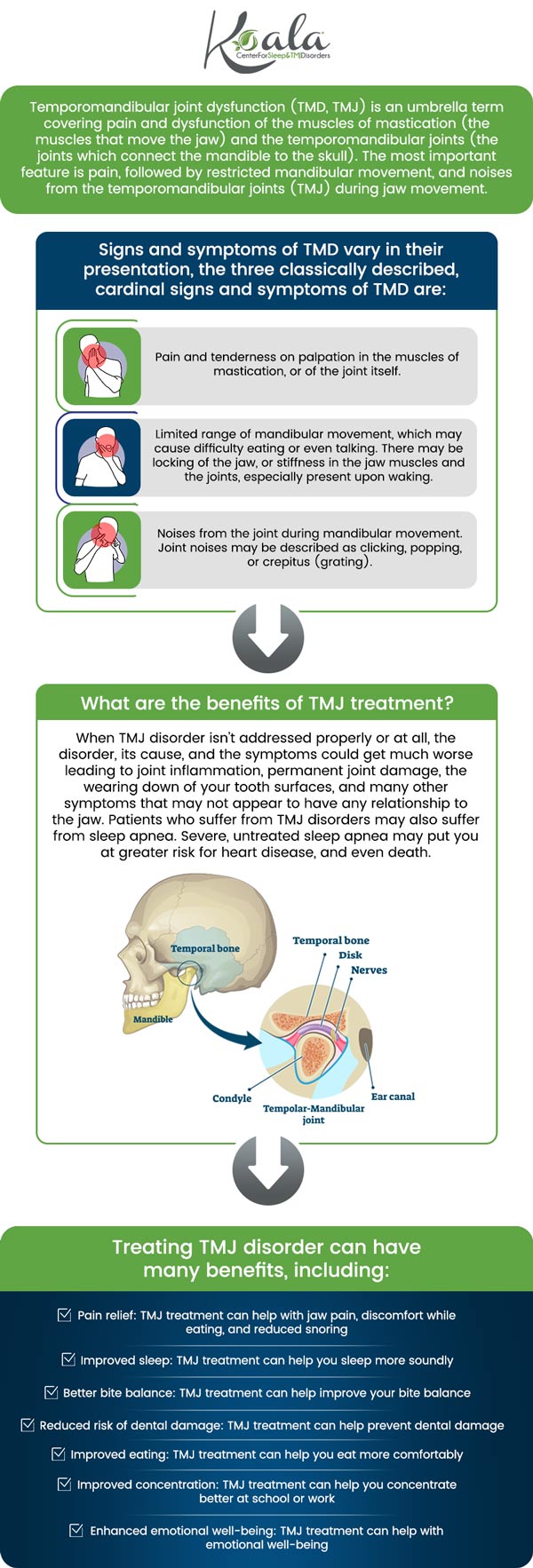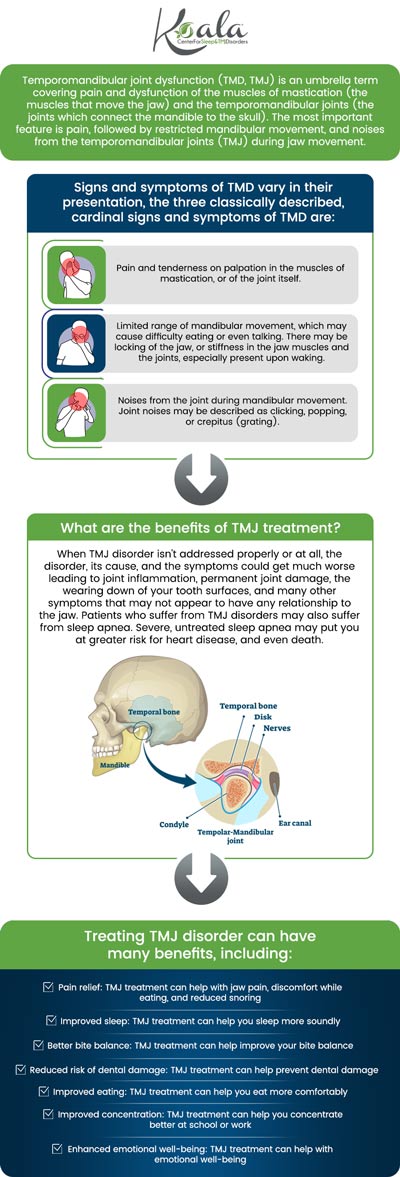Causes of TMJ Disorders and Treatment in Peoria, IL
TMJ disorders can be caused by factors such as teeth grinding, jaw injuries, stress, or arthritis, leading to jaw pain and headaches. At Koala® Center for Sleep & TMJ Disorders, our team offers personalized treatments like oral appliances, jaw exercises, and Botox injections to relieve symptoms and improve your quality of life. For more information, contact us or book an appointment online. We serve patients from Peoria/Dunlap IL, and surrounding areas.


Table of Contents:
What are the common causes of TMJ disorder?
Can stress contribute to TMJ disorder?
How do jaw injuries lead to TMJ disorder?
Is teeth grinding a primary cause of TMJ disorder?
We understand that temporomandibular joint (TMJ) disorder can significantly impact your daily life, affecting everything from eating to speaking and even sleep quality. TMJ disorder refers to problems with the jaw joint and the muscles that control jaw movement, and there are several common causes we frequently see in our patients.
One of the most frequent causes we address is jaw injury, which can occur from trauma such as a direct blow to the jaw or head. Our team also treats TMJ disorders related to arthritis, including both osteoarthritis and rheumatoid arthritis, which can damage the cartilage within the joint and lead to pain and limited movement.
Another common factor is chronic teeth grinding or clenching—also known as bruxism—which puts excessive pressure on the TMJ and surrounding muscles. Many patients are unaware they grind their teeth during sleep, which is why our center specializes in evaluating and treating sleep-related bruxism.
Malocclusion, or misalignment of the jaw and teeth, is another contributing factor we assess at Koala Center for Sleep & TMJ Disorders. When the bite is not properly aligned, it can disrupt the normal function of the TMJ, causing discomfort and dysfunction.
We also recognize the impact of stress on TMJ health. Increased stress can cause patients to clench their jaw or tighten facial muscles, further straining the TMJ. Our team provides guidance and therapies to help manage these habits and reduce their impact.
In some cases, connective tissue diseases that affect the tissues around the TMJ can also play a role in TMJ disorder, and our clinical approach includes a comprehensive evaluation to identify all potential contributing factors.
We understand that stress plays a significant role in both the development and worsening of TMJ (temporomandibular joint) disorder. The TMJ is essential for everyday functions like chewing and speaking, but when individuals experience high levels of stress or anxiety, they are more likely to clench or grind their teeth—a condition known as bruxism. This can put excessive strain on the jaw muscles and joints, leading to pain, inflammation, and dysfunction of the TMJ.
Stress also causes muscle tension throughout the body, especially around the jaw and neck. This additional tension can aggravate existing TMJ symptoms or even trigger the onset of TMJ disorder in those who are susceptible. Over time, chronic stress and muscle tightness can disrupt normal jaw function, resulting in symptoms such as jaw pain, headaches, difficulty chewing, and clicking or popping sounds in the jaw.
Our dedicated team specializes in diagnosing and treating TMJ disorders. We take a comprehensive approach that may include stress management techniques, custom oral appliances, physical therapy, and other non-invasive therapies tailored to your needs. Managing stress through relaxation methods, counseling, and lifestyle modifications can be an important part of your treatment plan.
Jaw injuries can significantly increase the risk of developing temporomandibular joint (TMJ) disorder, a condition we frequently diagnose and treat at Koala Center for Sleep & TMJ Disorders. The TMJ, located on each side of the jaw, connects the lower jawbone (mandible) to the skull and enables essential movements for talking, chewing, and yawning. When the jaw sustains trauma—such as a direct blow, fracture, dislocation, or even severe whiplash—the delicate balance and function of the TMJ can be disrupted.
After a jaw injury, inflammation, swelling, or damage to the soft tissues or cartilage around the TMJ are common. Sometimes, the cushioning disc within the joint may become displaced or damaged, leading to symptoms such as jaw pain, muscle spasms, clicking or popping noises, and restricted movement. Additionally, trauma can alter the way the upper and lower teeth fit together (malocclusion), which places further strain on the TMJ and surrounding muscles.
If not properly addressed, these changes can worsen over time, resulting in chronic pain, limited jaw function, and the full development of TMJ disorder. Symptoms may not appear immediately; instead, they can develop slowly as the tissues heal improperly or as the body compensates—such as by chewing on one side—placing extra stress on the joint.
At Koala Center for Sleep & TMJ Disorders, we frequently see patients who are concerned about the relationship between teeth grinding (bruxism) and temporomandibular joint (TMJ) disorders. While bruxism is often associated with TMJ problems, it is important to understand that it is not the sole or primary cause of TMJ disorders.
TMJ disorders encompass a range of conditions affecting the jaw joint and surrounding muscles. The causes of TMJ disorders are complex and multifactorial, including factors such as jaw injuries, arthritis, genetic predisposition, and certain connective tissue diseases. Bruxism can contribute to the development or aggravation of TMJ symptoms, as excessive grinding or clenching places additional strain on the jaw muscles and joints.
However, not everyone who grinds their teeth develops TMJ disorder, and some individuals with TMJ issues do not experience bruxism. This means that while bruxism is an important risk factor and can certainly worsen TMJ discomfort, it is not typically the root cause.
If you are experiencing jaw pain, headaches, or notice signs of teeth grinding, we encourage you to schedule a consultation with our specialists. Early intervention can help prevent further complications and improve your quality of life. For more information, please contact us today or request an appointment online. We serve patients from Woodland IN, Granger IN, Ardmore IN, Notre Dame IN, and surrounded areas.

Additional Services You May Need
▸ KoalaKIDZzz®
▸ Sleep Apnea
▸ Snoring
▸ TMJ Disorder
▸ Fatigue
▸ Sleep Disorders
▸ Weight Loss
▸ CPAP Alternative
▸ Oral Appliances




